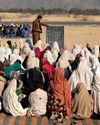
EVEN THE DAY BEFORE, the only people who knew exactly what was planned could be counted on the fingers of one hand. Israeli intelligence services had been deceived, or had failed to comprehend. Those who would take part, the militants of Hamas and some allied groups, did not yet know what they had been training for. To keep the secret, Yahya Sinwar, the head of Hamas in Gaza, had confided in three or four key lieutenants. Only they knew what was to come, and where, and when.
So on that Friday evening, in Rafah and Khan Younis, Tel Aviv and Sderot, in the kibbutzim of southern Israel, in Beit Lahia and Deiral Balah, life went on as usual. Only at 6.29 the next morning, when thousands of rockets launched from Gaza towards Israel across the lightening sky did anyone begin to suspect that this 7 October would be very different. Still, few anticipated the catastrophe it would bring, nor the year of crisis it would provoke.
Last weekend the regional war that so many have feared for so long was apparently closer than ever. More than 1,200 people, mostly civilians, died on 7 October. Of the 250 abducted that day by Hamas, half were released in a short-lived ceasefire in November and half of the remainder are thought to be dead. No one knows how many died in last Friday's massive strike in southern Beirut. More than 41,000 have been killed in Gaza, mostly civilians, one in 55 of the prewar population. More than 700 have died in Lebanon in the recent wave of Israeli attacks, including the leader of Hezbollah, Hassan Nasrallah.
When the sheer scale and brutality of the Hamas attack into Israel on 7 October became clear over the following days, it was obvious that Israel's response would be as unprecedented in scale and violence as the event that provoked it. From London, the big pessimistic picture seemed easy enough to paint: an ever-accelerating cycle of attack and retaliation that would eventually spread across the Middle East.
This story is from the {{IssueName}} edition of {{MagazineName}}.
Start your 7-day Magzter GOLD free trial to access thousands of curated premium stories, and 9,000+ magazines and newspapers.
Already a subscriber ? Sign In
This story is from the {{IssueName}} edition of {{MagazineName}}.
Start your 7-day Magzter GOLD free trial to access thousands of curated premium stories, and 9,000+ magazines and newspapers.
Already a subscriber? Sign In

Friendship interrupted
They were best mates. Then one had a baby, while the other struggled to conceive. They share their brutally honest takes on what happens when motherhood affects friendship

KERNELS OF HOPE
During the siege of Leningrad, botanists in charge of an irreplaceable seed collection, the first of its kind, had to protect it from fire, rodents-and hunger

A new horizon' The inverse link between cancer and dementia
Scientists have long been aware of a curious connection between these common and feared diseases. At last, a clearer picture is emerging

Across the universe
Samantha Harvey won the Booker prize with a novel set in space. Yet, she says, Orbital is actually 'a celebration of Earth's beauty with a pang of loss'

Frank Auerbach 1931 -2024
Saved from the Holocaust, this artist captured the devastation of postwar Britain as ifits wounds were his own but he ultimately found salvation in painting

Seven lessons I've learned after 28 years as economics editor
Margaret Thatcher was Britain's prime minister and Neil Kinnock was leader of the Labour party.

Droughtstricken dam leaves economies powerless
A ll is not well with the waters of Lake Kariba, the world's human-made lake largest A punishing drought has drained the huge reservoir close to record lows, raising the prospect that the Kariba Dam, which powers the economies of Zambia and Zimbabwe, may have to shut down for the first time in its 65-year history.

Let this be the end of these excruciating celebrity endorsements
I wish celebrities would learn the art of the French exit. But they can't, which is why Eva Longoria has announced she no longer lives in America. \"I get to escape and go somewhere,\" she explained.

Alive, but unable to thrive under absolute patriarchy
Since the Taliban returned to power, women and girls have tried defiance, but despair at their harshly restricted lives

‘It's tragic’ Reflection in the wake of Amsterdam violence
Carrying signs scrawled with messages urging unity, they laid white roses at the statue of Anne Frank, steps away from the home where her family had hidden from Nazi persecution.